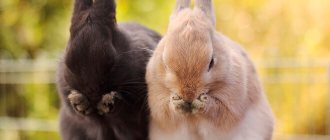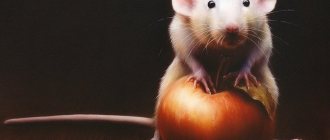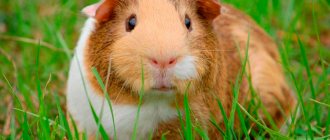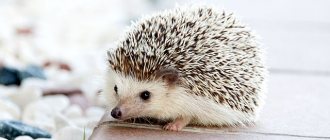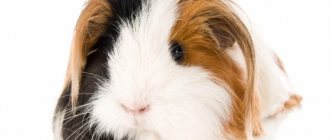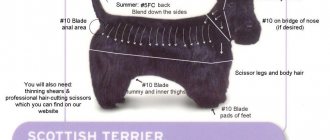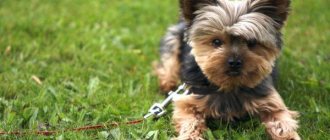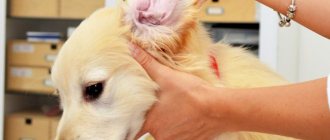Decorative breed rabbits have weak immunity and a sensitive digestive system. Having decided to get a pet, it is important to study not only the features of caring for it, but also find out what to feed the decorative rabbit. The health of the animal directly depends on the quality of food. This article will discuss the rules for creating a diet for eared animals.
Decorative breed rabbit with carrots
Features of digestion of decorative rabbits
Decorative rabbits include breeds artificially bred by humans for home keeping. Inbred animals are not particularly healthy. Due to the sensitive gastrointestinal tract, any changes in diet or incorrectly selected foods can lead to various diseases.
For decorative rabbits, a menu consisting of a variety of foods is selected. In addition to greens, food should contain protein, for example, cereals (barley, oats). Hay and shoots are suitable for grinding teeth. The pet receives useful microelements from vegetables and fruits; during the off-season, these can be ready-made supplements.
In addition to a balanced diet, the animal’s strong appetite is also taken into account, especially for rabbits.
If portion size and number of meals are not controlled, this can lead to obesity. Excess weight leads to heart problems, as well as the ability to reproduce.
Ready-made feeds and concentrates
The simplest option is to choose granulated feed to provide adult animals with a complete diet. The finished food consists of grass meal, which contains forbs containing a whole range of vitamins. It is important that it contains oats or wheat (at least 20% of the total mass). In some feeds you can find corn, barley, cereals and wheat bran. And the most important component is processed sunflower, which improves the condition of the coat, preventing its loss.
Note! The introduction of combined food into the animal’s diet can lead to rapid weight gain. They can replace natural products several times a week. Young individuals should be given 1 tbsp. spoon 3 times a day, and for adult rabbits 1 tbsp will be enough. spoons 2 times a day. This is necessary so that the animal is provided with a full range of important microelements and vitamins.
Mr. Tail recommends: feeding rules and diet
Domestic rabbits should not be starved; there should always be food in the cage. This is due to the fact that digested food can move through the intestines only after new food has arrived. These animals eat small portions up to 80-90 times a day.
If you take long breaks, the process of fermentation and rotting of food and feces begins. As a result, the rabbit will suffer from stomach cramps, and strongly fermented food will cause bacteria to multiply and lead to the death of the pet. Therefore, hay, bark, and branches are always left in the cage. Green and succulent food is given twice a day in the morning and in the 2nd half of the day in small portions.
There should always be clean and fresh water in the drinking bowl.
Features of feeding in winter
The rabbit's stomach is designed in such a way that new food pushes out old food. Accordingly, long-eared animals must constantly chew something. For the winter, it is worth preparing fresh hay from tender grasses and meadow plants in advance. As well as young branches and bark. In the cold months, the percentage of succulent foods in the diet is increased: pumpkins, turnips, carrots, greens.
Expert opinion
Zarechny Maxim Valerievich
Agronomist with 12 years of experience. Our best country expert.
Ask a Question
It is important to ensure that the animals do not freeze and that the feeder is not in a draft area. Additional heating and timely cleaning of the cage or enclosure are required.
Diet of a decorative rabbit
The diet of the decorative rabbit is quite varied: it includes both ready-made food and greens, as well as useful minerals and additives.
Roughage
First of all, the rabbit should have hay in its cage. It is useful and helps to grind down the animal's teeth. This also includes grains, such as oats, which are rich in protein and help improve digestion.
Grasses and green food
They must be included in the diet of rabbits, as they are beneficial for their health and prevent the development of various pathologies.
Not all vegetables and fruits can be given to your pet, especially in large quantities. For example, you should limit your consumption of green peppers and cabbage. At the same time, if the vegetables have been purchased, they are first peeled. Feeding with green food begins at 4 months.
When choosing herbs, first of all pay attention to its freshness. To do this, they carefully sort out so as not to miss poisonous varieties. Rabbits are not able to distinguish a plant that is dangerous to their life; the owner takes care of this.
It will be useful for Rabbit to add to the menu:
- plantain;
- nettle;
- dandelion;
- yarrow.
It is dangerous to give:
- swamp whitewing;
- dope;
- horned cornflower;
- spurge;
- buttercup;
- Great celandine.
They often grow in shady and damp places. Many poisonous herbs lose their toxic properties after drying.
Vitamin and mineral supplements
In winter, when there are not enough green foods in the diet, ready-made mineral supplements are introduced. This is necessary so that if there is a lack of vitamins, problems with the rabbit’s health will not arise.
The dosage of supplements should not be calculated independently. It is better for the owner to check the norm with a veterinarian, who, after examining the animal, will advise the manufacturer of the drugs and the required amount of minerals, according to the age, weight and physical condition of the pet.
Ready-made feeds and concentrates
Store-bought food for decorative rabbits should not constitute 100% of the animal’s diet; it can replace one meal. If used frequently, your pet may experience rapid weight gain and decreased activity.
However, the feed contains useful components that the rabbit needs.
Fruits and berries
Feeding dried fruits as a treat is allowed. They also give out fruits, for example:
- apples;
- bananas;
- pears;
- melon;
- dried apricots;
- strawberry.
It is worth refraining from exotic foods that your pet’s body cannot digest.
The amount of fruit is minimal and does not replace a full meal.
How and what to feed a dwarf rabbit
The key rule is that food for animals should be varied. However, they need fresh water every day. It should be filtered, but under no circumstances should it be mineral or boiled. Also, to prevent various diseases, you need to rinse the drinking bowl with hot water every time.
Ideally, feeding should be carried out at strictly established times - morning and evening in certain volumes. One decorative rabbit requires an average of 30 g of feed. Knowing this, you can easily establish an optimal diet. Herbal and leafy diets help these animals cleanse their intestines.
Important! After depositing or purchasing a baby rabbit, it should be fed for another week with the same food that it received previously.
Daily diet of decorative rabbits
To stimulate the digestive processes, the rabbit must have hay available. It is usually hung in small bunches in a cage.
The daily diet usually looks like this:
- 80% hay;
- 10% concentrate;
- 5% vegetables and fruits;
- 5% fresh herbs.
When adding new products to the menu, this is done gradually. An important point is to monitor the condition of the pet.
If a food causes distress, it should be excluded from the diet.
Minerals for grinding teeth
Rabbits wear down their teeth on their own, this is facilitated by the food they eat, namely:
- Grass;
- Hay;
- Branches;
- Compound feed.
There is a tool that provides additional assistance in this necessary process. A treat for a pet, which is a mineral stone. It consists of flour of various seeds and plants, gypsum, chalk used in feeding, and berry extract. In addition to daily assistance in grinding teeth, it provides the animal with necessary vitamins and minerals. Instead of berries, it may contain dry vegetables, for example, carrots, seaweed. You need to choose based on your pet’s taste.
Dry factory or natural food
To keep your pet rabbit healthy, you should give preference to natural food, but in some situations, owners also buy factory-made food. However, you should know that granulated food should not be a constant part of the animal’s diet, since:
- difficult to digest;
- contains a small amount of plant fiber;
- promotes obesity;
- accumulation of minerals leads to urolithiasis;
- small granules prevent teeth from grinding down;
- due to swelling, it stretches the stomach and damages its mucous membrane.
What vitamins do rabbits need?
The diet of all atypical breeds of rabbits must contain vitamin supplements:
- A. Responsible for the functioning of the nervous and reproductive systems.
- B vitamins. Necessary for a healthy coat and proper digestion.
- D. Regulates the absorption of minerals and other chemical elements needed by the body, is responsible for the strength of bones and tendons
- C. Responsible for strong immunity, normal functioning of the digestive tract and iron absorption.
- E. The substance ensures healthy offspring and regular offspring without loss of health of the female, and also strengthens muscles.
- K. Affects the elasticity and strength of the walls of blood vessels, most important during the breeding season.
Harmful food for domestic rabbits
Not all products are given to pets as food; some of them can be hazardous to health. The following are completely excluded from the menu:
- herbs: celandine, dope, lily of the valley and other poisonous plants;
- branches: elderberry, bird cherry, peach, walnut, plum, sweet cherry and cherry;
- fruits: avocado, figs, mangoes, oranges;
- stale or moldy hay;
- milk, cottage cheese, sour cream;
- green potatoes;
- cereals: rice, millet, rye;
- sweets;
- food from the human table.
Fruits and berries
Fruits and berries are an excellent source of carbohydrates for furry animals. A delicacy in the form of dried fruits is allowed in a minimum quantity. As for fruits, pets especially like to eat apples, bananas and pears, which can be mixed with root vegetables or vegetables. However, it is important to remember that decorative rabbits should not be fed exotic fruits, as their stomach may not be able to cope fully.
Fruits and berries
All fruits are given in minimal quantities, not as a complete dish, but just a delicacy. The main fruits that are allowed to feed domestic rabbits are: melon, dried apricots, tangerines, strawberries and raspberries. They must first be prepared: thoroughly washed, dried and finely chopped. The seeds must be removed immediately. Fruits that are too sweet should be given somewhat less frequently. Also, rabbits should be given prunes at least once every 2 weeks, as they help get rid of residual fur in the stomach.
Feed storage methods
Collected or purchased hay can be stored in bags in the apartment. You should first inspect the roughage for the presence of insects and the absence of traces of rodents.
Good hay should be dry and brittle and free of mold.
Branch root brooms are hung on hooks. There should be enough space so that they do not touch each other and do not crumble. The bundles are not untied before being given to the animal.
Vegetables and fruits in urban areas are purchased in small quantities. The grass is issued fresh on the day of collection.
How to prepare food?
Food for decorative rabbits - grain, hay, root crops - are prepared for future use. The cut grass is dried well in the fresh air, avoiding direct sunlight, and then stored in bales in a ventilated area.
It is advisable to prepare branch feed in June. You need to cut shoots about 0.8 cm thick and up to a meter long and tie them into brooms, then dry them thoroughly. Vegetables are carefully sorted after harvesting and sent to the cellar, where the air temperature does not exceed 10 degrees Celsius and does not drop to zero.
Rotten vegetables or root crops and moldy hay are prohibited from being given to rabbits: they can become poisoned and even die.
